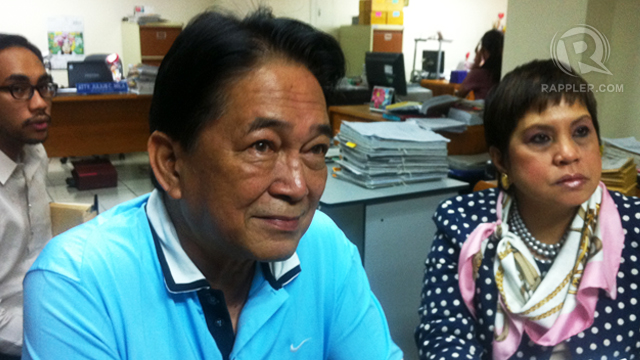SUMMARY
This is AI generated summarization, which may have errors. For context, always refer to the full article.

MANILA, Philippines – Testifying for the first time in a celebrated murder case, former Air Force Lt Col and ex-coup plotter Eduardo “Red” Kapunan admitted he ordered the surveillance of labor leader Rolando Olalia before his murder in 1986, but added he had the operation terminated.
Kapunan appeared before the Antipolo regional trial court 6 months after his surrender to the Army. Now detained at the National Bureau of Investigation, he faces murder charges for the killing on Nov. 13, 1986 of Olalia and his aide Leonor Alay-ay.
Kapunan told the court that he had Olalia trailed following reports that the government of then President Corazon Aquino had “linkages” with the Left. Olalia was at that time the charismatic leader of the leftist Kilusang Mayo Uno.
“I admit I ordered surveillance but recalled it because I was being transferred,” he said in a hearing on his motion for bail.
Kapunan was head of the Special Operations Group (SOG) under the Department of National Defense when he ordered Olalia’s surveillance. The defense minister at the time was Juan Ponce Enrile, now Senate President.
It was a tumultuous time for the Cory Aquino government. The Reform the Armed Forces Movement (RAM), which Kapunan co-founded, attempted many times to bring down Mrs Aquino on fears that leftists were running her government. RAM formed the backbone of the military rebellion that helped oust Ferdinand Marcos in a popular revolt in February 1986 and catapulted Mrs Aquino to the presidency.
Most of the RAM leaders eventually formed the SOG that provided security to Enrile.
The other commanding officer of the SOG was then colonel and now Sen. Gregorio Honasan, as claimed by prosecution witness and former sergeant Eduardo Bueno in an earlier testimony. Honasan, running for re-election in May, has said his implication in the double murder case is “politically-motivated.” (Honasan and Kapunan are 1971 graduates of the Philippine Military Academy.)
After EDSA
Kapunan said he tasked then TSgt. Medardo D. Barreto to conduct the surveillance on Olalia after the February 1986 EDSA revolution. Kapunan recalled that another group headed by then Sgt. Edger Sumido conducted surveillance on human rights lawyer Augusto “Bobbit” Sanchez, who was then labor secretary.
Kapunan however said he had the surveillance operations recalled in September 1986, because he was then transferred to the general headquarters of the Armed Forces. “When I received order transferring me, I gathered special operations group and also terminated surveillance…I said whoever took my place, it’s up to him to continue operations or not,” he said.
Two months after the said surveillance operations were reportedly terminated, Olalia and his companion Leonor Olay-ay were found dead in Antipolo on Nov.13, 1986. The other commander of SOG then was ex Air Force Col. Oscar Legaspi.
The death of Olalia, who was also a lawyer, was said to have been part of the “God Save the Queen” plot of RAM to oust Mrs Aquino and install a military junta.
Barreto earlier told the court that as far as he knew, Kapunan and 12 other members of the military ordered the killing of Olalia. (Kapunan surrendered to the military on Oct 6, 2012.)
When asked why he turned himself to the police, he told the court that he wanted to “test” the amnesty granted to them in 1995 by then President Fidel Ramos.
Following a peace agreement it signed with RAM (which by that time had been renamed Rebolusyonaryong Alyansang Makabansa), the Ramos government granted unconditional amnesty to 3,731 military officers and soldiers involved in the 1989 and 1987 coup attempts against the Aquino government.
In the 1998 presidential elections, Kapunan himself ran for congress in Panay. He lost.
Lorna Kapunan, lawyer and sister-in-law of Eduardo Kapunan, said the amnesty covered all crimes, and that this is part of their defense against the murder charges filed against him. – Rappler.com
Add a comment
How does this make you feel?
There are no comments yet. Add your comment to start the conversation.